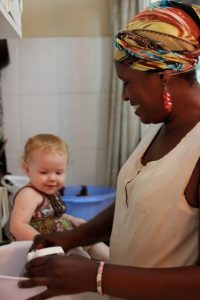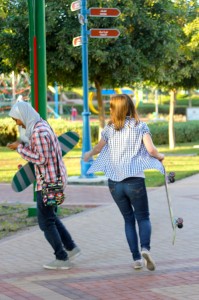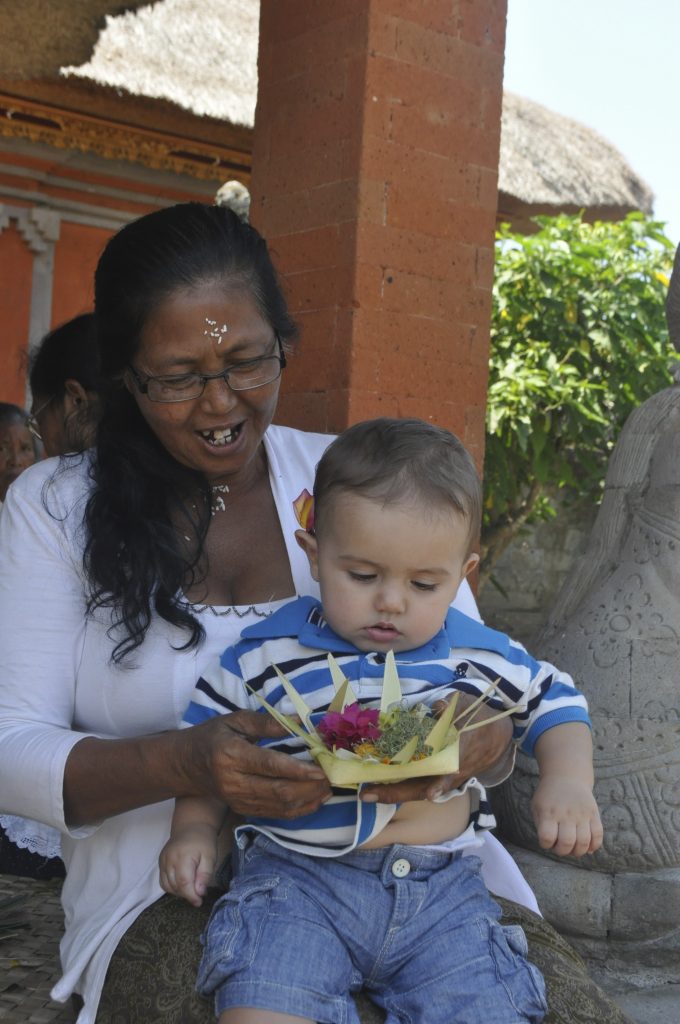
by Sarah Sensamaust | Jun 12, 2013 | Africa, Child Care, Childhood, Cultural Differences, Family, Home, Living Abroad, Motherhood, World Motherhood

Look for Congo on any list ranking quality of life, poverty rate, violence per square meter, etc. and we don’t fare well. Great place to raise a kid, right?
Well, actually, for us, yes.
My friend Jill is my neighbor, co-worker and blogging partner on our blog Mama Congo. We raise our children, along with our husbands, in the Democratic Republic of Congo. What we lack in first world standards, we make up for in mamas. Our children call at least 6 women “mama.” Maybe more depending on the day.
In the Congo every woman is called “Mama So-and-So.” I’m Mama Sarah, she’s Mama Jill, and the women who come to our homes everyday and help us raise our children are Mama Youyou, Mamicho, Mama Vida and Mama Nounou. That’s a lot of mamas between our two households.
My husband Adam and I moved to the Congo five years ago and Jill and her husband Johan moved in next door a little while later. Our children all run around together getting bit by mosquitoes while we call for them to return to their respective houses. It’s a great life; made possible mostly by our mamas.
Jill and I are about to travel back to the States to visit our families for the summer. We’ll spend time with the grandparents, show off the new tricks our kids can do, and indulge in all the food we can’t find in Congo. But sometimes it’s hard to leave our little “village” of women raising our children with us.
Sure we’ll miss their help, but what we mostly miss is how totally fun and wacky and sometimes completely puzzling it is to raise your kids with a Congolese woman by your side. For example, sometimes we’ll find the mamas up in a tree throwing fruit down to our kids. They yell in French, “Look out below!” As star fruit or bunches of bananas rain down.
Every now and then from my office window I’ll see them toting our children on their backs when their little legs are too tired to walk home from the playground. Even the smallest baby cries, “Au dos. Au dos,” (on your back) when she wants to hitch a ride.
I know that if my daughter hasn’t eaten enough of her breakfast, I’ll get an earful when Mama Youyou shows up. She examines the size of her belly, determines it’s not properly filled, and then coaxes her into eating more. Next she reminds me I need to keep my kids nice and fat so that if they get sick they’ll be okay.
When the kids do inevitably get sick, the mamas are the biggest worriers. I get that. Where we’re from in the States, children get sick and then they get better. Here in Congo, that’s not a guarantee. So everyone hovers and shakes their heads and carries them au dos all day while rotating cold washcloths on their foreheads. It’s a major production. And the children love it.
Sometimes people ask us if it’s hard to share that title of “mama” with others. It isn’t. It really isn’t! We feel like the luckiest mamas because our children are being raised in such a different and loving way. Sure, it took some time for everyone to adjust and learn their place in the household, but we’ve all got into a rhythm now. I hold this end, you hold that end as we wrestle their filthy bodies in the tub.
I think every mother can agree that raising your children with a lot of help, mixed in with doses of advice, and sprinkled with good old fashioned judgment to keep you on your toes, is a great way to be a mama.
Do your children have other “mamas” where you live? Who are they, and how do they help you?
This is an original post written for World Moms Blog by Sarah. You can find Sarah blogging with Jill at Mama Congo.
Photo credit to the authors.

by Mannahattamamma (UAE) | May 22, 2013 | Body Image, Cultural Differences, Feminism, Human Rights, Religion, SAHM, Sex, Tunisia, UAE, Womanhood, Women's Rights, World Events, World Voice
 I used to have a college professor—of women’s studies, of course—who would occasionally start class when we were particularly chatty and inattentive by saying, loudly, “SEX!” Our heads would whip around to stare at her and the room would be silent.
I used to have a college professor—of women’s studies, of course—who would occasionally start class when we were particularly chatty and inattentive by saying, loudly, “SEX!” Our heads would whip around to stare at her and the room would be silent.
The professor would chuckle and then start the lesson, which almost never had anything to do with sex—or at least not sex in an interesting way. Her way of talking about sex was dry and academic, having to do with words like “hegemony” or “heteronormative.”
I thought about that professor a few weeks ago when I read about “International Topless Jihad Day,” sponsored by FEMEN in support of Amina Tyler, who had sparked a global controversy by posting a topless pictures of herself on Facebook with “my body belongs to me and is not the source of anyone’s honor,” scrawled on her naked chest in Arabic. Tyler’s life—and the lives of her family—were threatened after the pictures were posted; she has since left Tunisia, where she lived.
The topless jihadists claimed that their actions showed solidarity with Amina and sent a message to the world that women’s bodies belong to no one but themselves. And yet it seems a bit like my professor yelling SEX! FEMEN is yelling BOOBS–and the topless jihad did, it’s true, get a lot of press coverage. The coverage drew attention to Amina’s plight but also gave respected media outlets a chance to run pictures of boobs and more boobs: Huffington Post ran a whole slideshow of revolutionary boobs. (more…)
After twenty-plus years in Manhattan, Deborah Quinn and her family moved to Abu Dhabi (in the United Arab Emirates), where she spends a great deal of time driving her sons back and forth to soccer practice. She writes about travel, politics, feminism, education, and the absurdities of living in a place where temperatures regularly go above 110F.
Deborah can also be found on her blog, Mannahattamamma.
More Posts
Follow Me:


by hjunderway | May 20, 2013 | Being Thankful, Child Care, Childhood, Cultural Differences, Education, Expat Life, Family, France, International, Language, Life Lesson, Living Abroad, Motherhood, Multicultural, Parenting, Preschool, Relocating, World Motherhood, Younger Children
 Looking back to my pregnancy as an almost mom to my one and only son, I literally had everything prepared for the first nine months of his life before his eyes ever saw the outside world.
Looking back to my pregnancy as an almost mom to my one and only son, I literally had everything prepared for the first nine months of his life before his eyes ever saw the outside world.
Diapers and clothing gently washed and neatly lined up by size, ready for each growth spurt, each passage from newborn to infant and beyond. I bought “What to Expect….” for the first three years of his existence, pouring over every detail and mentally preparing myself for each developmental stage. I was ready for it all.
My planning served me well for the first three years of my son’s life, and then we up and decided to move to a foreign country. The “What to Expect” books were packed away in long-term storage in the United States, and along with it, my sense of direction as a mother.
We have spent the last year attempting to navigate our way through life in France when French isn’t your primary language, when there aren’t any grandparents to lend a hand, and when all that is familiar becomes a distant dream.
When we arrived in France, my son was 2 years, five months and together we plowed through understanding new social norms, French cuisine, and more recently, the education system.
We did this without a manual, and did okay without it. There were times when I just wanted to type in “raising an American boy in Paris” in Google to look for tips and clarity on what we were doing wrong (or right). If there had been a manual or how-to book, I would have read it 1,000 times and given copies to all of my new expatriate friends with children.
I wasn’t sure that we were doing right by our son when we entered him into a French school at age three (standard practice in France), when the teachers and students couldn’t even pronounce his name correctly. I wasn’t sure that we were doing it right when potty training took a huge deviation and we faced mounting laundry that took forever to dry on racks in our living room.
I know I wasn’t sure that we had done right by our son when he had a meltdown at a friend’s playgroup,hitting and kicking anyone and everyone who came into his path. When I had to pack him up early and head home, I may have had a meltdown myself. Again and again, I was looking for grand gestures in my son’s behavior as proof that he was adjusting appropriately to living in a new country, and I couldn’t find any.
Why do we always look for the grand gestures? Without a guide, we often get caught up looking for the big things and forgetting to spot the small ones.
For example, at 6 months of age, I knew that my son wasn’t able to crawl because he hadn’t developed enough upper body strength to support his head, which was off the charts developmentally. I knew this because the books and doctors told me so, and therefore I had an appropriate course of action to get him back on track. Having a guide instilled in me a parenting confidence that I knew my son and that we were doing everything right, but by whose standards?
Now, a year later and closer to preschool age than that of toddler, I find myself discovering more and more of the small indications that my little one is doing just fine transitioning in our new life abroad. I see it when my son doesn’t realize I’m watching and instead of saying, “Look, look!” with excitement, he yells out, “Regarde, regarde!” (Look in French.)
I see it when he stops to hug a strange toddler crying in the playground, or when he asks me if we can take an airplane home to see his grandparents and cousin. I see it when he takes my hand to cross the street but instead of letting go immediately, he gently slides his thumb repeatedly across my knuckles, something I’ve done to him a thousand times. As time goes on, he becomes more and more self-assured and more at home being who he is. And no manual could have prepared me for that.
Has there been a time when a manual or how-to book couldn’t help you effectively parent your child through a unique situation?
This is an original post to World Moms Blog by Jacki, an American expatriate mother living in Paris, France.
The image used in this post is credited to the author
Jacki, or “MommaExpat,” as she’s known in the Internet community, is a former family therapist turned stay-at-home mom in Paris, France. Jacki is passionate about issues as they relate to mothers and children on both domestic and international scenes, and is a Volunteer Ambassador for the Fistula Foundation. In addition to training for her first half marathon, Jacki can be found learning French in Paris and researching her next big trip. Jacki blogs at H J Underway, a chronicle of her daily life as a non-French speaking mom in France.
More Posts

by Ana Gaby | May 1, 2013 | Cultural Differences, Expat Life, Eye on Culture, Family, Indonesia, International, Living Abroad, World Moms Blog
 Lately I’ve read so many articles regarding the so-called “mommy-wars”. They are all over the news, on magazine articles on blogs and even on TV. Every time I read a new article I’m surprised to find that alongside fulfilling the always challenging role of being a mom the expectations and pressures we put on ourselves to be perfect in everything we do are not only unattainable but exhausting.
Lately I’ve read so many articles regarding the so-called “mommy-wars”. They are all over the news, on magazine articles on blogs and even on TV. Every time I read a new article I’m surprised to find that alongside fulfilling the always challenging role of being a mom the expectations and pressures we put on ourselves to be perfect in everything we do are not only unattainable but exhausting.
When I think of these things, I’m just so glad to be in someway sheltered from it. I live in a completely different world. I live in South East Asia, and I’m not a local, so the expectations put upon me are quite bearable and, in fact, easy to fulfill.
From the day I became a mother and gave birth to my first son in Thailand (where the nurses pampered me with massages and asked me if I would prefer the Thai, Japanese or Western menu!) to the day I came to Jakarta with a big pregnant belly and was rushed thru the express lane in the airport, being a foreign mom in South East Asia has been a fun and eye-opening experience from day one. (more…)
Ana Gaby is a Mexican by birth and soul, American by heart and passport and Indonesian by Residence Permit. After living, studying and working overseas, she met the love of her life and endeavored in the adventure of a lifetime: country-hopping every three years for her husband’s job. When she's not chasing her two little boys around she volunteers at several associations doing charity work in Indonesia and documents their adventures and misadventures in South East Asia at Stumble Abroad.
More Posts

by Karyn Wills | Apr 25, 2013 | Cultural Differences, Eye on Culture, Human Rights, Humanity, New Zealand, World Moms Blog, World Voice
 So, you have one national day? Here in New Zealand we have two…sort of.
So, you have one national day? Here in New Zealand we have two…sort of.
The official national day for New Zealand is Waitangi Day on 6th February but I’ve always been reluctant to write about it; it’s not much of a day of celebration here. There are no buntings or fireworks; there are no parades or people getting dressed up in national costume. It’s a political hot-potato and it’s all a bit “blergh” for many Kiwis.
The problem is one of those dilemmas of humanity: conflict has arisen from good intentions.
Back in 1800s, when the world was being colonized by the English and Europeans, there was a widely held belief, by the colonisers, that unless the landscape had been changed through agriculture or construction it was considered to be unoccupied and unowned. We all know how that turned out for many indigenous peoples. To a great extent, that was no different for the resident population of Maori who had been here for over a 1,000 years by the time the Europeans arrived. The difference has been that we have a Treaty, a signed document between the representatives of Queen Victoria and various Maori chiefs of the 1840s.
The problem is this: there are two versions of the treaty. One written in English and one written in Maori. I’m sure you can all appreciate that you cannot always get a direct translation between two very different cultures and languages. The treaties don’t actually match and, in spirit, they are very different. (more…)
Karyn is a teacher, writer and solo mother to three sons. She lives in the sunny wine region of Hawke’s Bay, New Zealand in the city of Napier.
More Posts

by Melanie Oda (Japan) | Apr 22, 2013 | Cultural Differences, Education, International, Japan, Living Abroad, Motherhood, Traditions, Weather, World Motherhood, Younger Children

Handmade shoe and apron bags made by the author.
April in Japan brings with it warmer temperatures, cherry blossoms, and the beginning of a new school year.
Children who are entering first grade, which is the first year of elementary school here, have a lot to prepare. Many of the items are the same as what school children in the rest of the world need: pencils, erasers, a pencil box, notebooks. But some are peculiar, if not to Japan, than at least to earthquake prone regions. (more…)
If you ask Melanie Oda where she is from, she will answer "Georgia." (Unless you ask her in Japanese. Then she will say "America.") It sounds nice, and it's a one-word answer, which is what most people expect. The truth is more complex. She moved around several small towns in the south growing up. Such is life when your father is a Southern Baptist preacher of the hellfire and brimstone variety.
She came to Japan in 2000 as an assistant language teacher, and has never managed to leave. She currently resides in Yokohama, on the outskirts of Tokyo (but please don't tell anyone she described it that way! Citizens of Yokohama have a lot of pride). No one is more surprised to find her here, married to a Japanese man and with two bilingual children (aged four and seven), than herself. And possibly her mother.
You can read more about her misadventures in Asia on her blog, HamakkoMommy.
More Posts

















